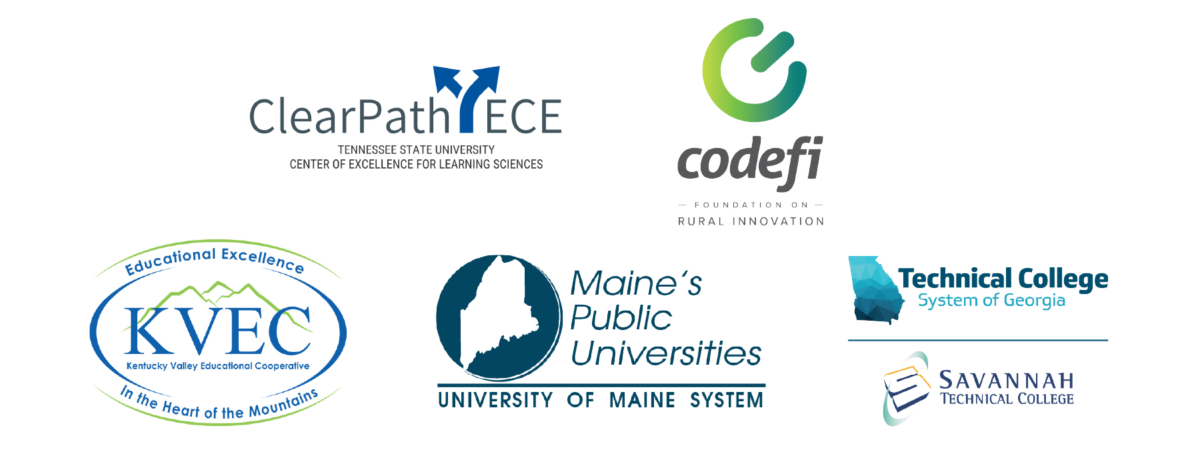
May 20, 2021 | By Sarah Cacicio
These partners were selected as part of our landscape research on how micro-credentials may be used to promote economic recovery among rural learners impacted by poverty, particularly for Black, Latinx, and Indigenous communities. The five selected partners are:
We came across many promising examples of micro-credential use, and look forward to featuring this work in our landscape report this fall. Here is a sneak peek at our five lead partners!
Region: Mississippi Delta, with a focus in Southern Missouri and West Kentucky
Industry: Software Development
Codefi Foundation on Rural Innovation is focused on expanding access to digital jobs in software development for high-poverty communities. They recently launched a Department of Labor-funded project, “Delta Digital Workforce Coalition,” to design short-term career pathways in software development using micro-credentials. They have partnered with Lincoln University, a Historically Black College or University (HBCU), to engage students of color from the “Boot Heel” region of Missouri. Codefi expects to train over 300 new entrants and incumbent workers in their Full-Stack Web Developer program, involving immersive skills-based training, interview preparation, employer-sponsored capstone projects, and paid internships.
Region: Eastern Kentucky, Appalachian Region
Industry: Nonprofit Education Service Agency; K-12 Educator Professional Development
Kentucky has nine educational cooperatives, and KVEC serves the southeastern Appalachian region, including one of the poorest school districts in the nation. KVEC has developed a niche in providing free, flexible professional learning opportunities for rural K-12 teachers through micro-credentials. Teachers in Kentucky are able to leverage micro-credentials to personalize continuing education and increase their rank, which is tied directly to salary. KVEC’s work builds on local needs of their teachers, such as developing micro-credentials in Understanding Types of Poverty. KVEC’s micro-credentials are hosted on the Digital Promise Micro-credential Platform and are free and available to the public.
Region(s): Statewide
Industries: Healthcare, IT & Technology, Manufacturing
Savannah Technical College and a consortium of the Technical College System of Georgia was awarded a U.S. Department of Labor Grant of $4.85 million to address labor market demands for a technically skilled workforce. In collaboration with workforce development and employer partners, the consortium will support adult learners in gaining micro-credentials to demonstrate their skills and transition quickly from unemployment to employment, and to progress in their careers. They will also upgrade online learning environments, expand credentialing, and integrate virtual reality (VR) learning experiences for workers, including dislocated workers, incumbent workers, and new entrants to the workforce.
Region(s): Statewide
Industry: Early Childhood Education (ECE)
The Center of Excellence for Learning Sciences at Tennessee State University, an HBCU, launched the ClearPath ECE online learning community to promote college and career pathways in early childhood education through micro-credentials. The Center of Excellence received a grant from the Tennessee Board of Regents to build a community that ECE educators from ages 18 to 45 could access using mobile data or internet in rural areas and internet deserts. ClearPath will provide micro-learning modules, a social learning platform, as well as webinars. ClearPath delivers interactive content by breaking down complex concepts into fragments, or bite-sized “nuggets” of information developed using effective learning pedagogy. Students will have 24/7 access to the platform, progressing through the content at a pace suited to them. In partnership with community colleges, universities, and Early Head Start centers across the state, the goal is to bring a college degree and social mobility within reach for hundreds of ECE students and providers, especially among Black and Latinx women.
Region(s): Statewide
Industries: Computer Support; Education; Professional Skills
This project will explore the All Learning Counts–Maine initiative, a partnership of 11 of the state’s leading education and workforce development organizations, including the Maine Department of Education/Adult Education and Eastern Maine Community College. Their statewide micro-credentialing ecosystem allows the University of Maine System and its partners to develop coordinated micro-credentials and better connect with Maine employers and its most rural communities. All are mindful of building equity in access and training, with a focus on low-income, New Mainers (including immigrant and refugee populations), Indigenous, and re-entry citizens. The University of Maine System and the Maine Community College System also offer micro-credentials including Education Design Labs 21st Century Skills badges.
Funding for this project is generously provided by Ascendium Education Group. Reach out to the Digital Promise Adult Learning Team to learn more at adulted@digitalpromise.org.
By AJ Foster and Babe Liberman
By Josh Weisgrau and Teresa Solorzano